Referee / Assistant Referees Relationship
- Referees decides all calls but the effective referee uses information from the assistant referees
- Assistant Referees assist the referee, particularly when they may have a better or closer view than the referee
- Referee may use assistant referee information, including cancellation of a goal
- Referee has duty to act on information when they have not see the incident
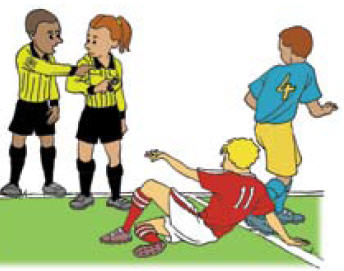

The recommended uniform for a new referee is a short-sleeve gold with black pinstripes.
The other uniforms can be purchased and may become necessary as the referee progresses to higher level matches.
In the beginning, however, the short-sleeve gold is the best choice.
In the event of cold weather, a long sleeve black sweatshirt (or other warm clothing) can be worn beneath the short-sleeve shirt
Referee Equipment - The following items are recommended for the referee to be prepared for each match
- 2 watches - a second one in the event the first one stops working
- Flags - it is normally the responsibility of the referee to supply the assistant referees with flags
- 2 whistles - it is recommended that the whistles have a different tone in the event that a referee at a neighboring field has the same type of whistle and in turn causes confusion
- 2 Pen/pencil - to record key information (e.g., misconduct, injuries, goals, etc.)
- Coin - To determine the direction of the kick-off
- Game book - to record information. Many youth leagues provide a scorecard
- Cards - to display when misconduct occurs



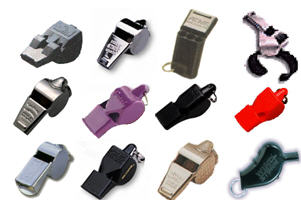

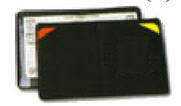






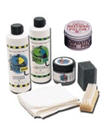
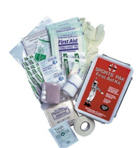
Sensible Extras - Some of the following items may be good things to keep in your referee bag. This list is not all inclusive.
- Air pump/gauge - to assure properly inflated game balls
- Extra whistles and lanyards - In case one breaks
- Sunblock/Lip Balm - For sunny days when you are on the fields for several matches
- Extra socks - For wet days to keep your feet dry and comfortable
- Different shoes - "flats" for turf or soft ground and "cleats" for wet or muddy fields
- Snack - to keep your energy up for an extended time
- Water - to stay hydrated
- Shoe Care Kit - to keep your shoes clean and supple
- First aid kit - for emergencies



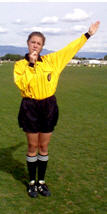

Indirect Free kick
Throw-In

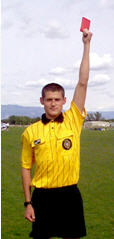
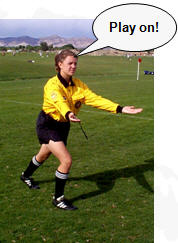
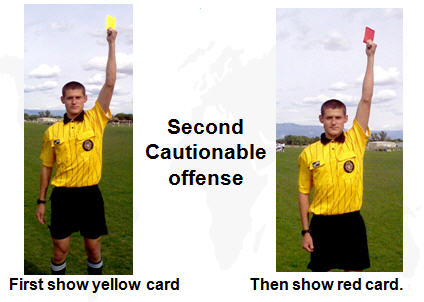
Caution Send-off Advantage
Referees have the power to apply (and signal) the advantage upon seeing a foul or misconduct committed if at that moment the terms of advantage clause were met.
Applying advantage permits the referee to allow
play to continue when the team against which the foul has been committed
will actually benefit from the referee not stopping play.
The referee must remember that the advantage applies to the team of the
fouled player and not just to the fouled player.
Soccer is a team
sport and the referee is expected to apply advantage if the fouled
player's team is able to retain or regain control of the ball
The referee may return to and penalize the original foul if the
advantage situation does not develop as anticipated after a short while
(2-3 seconds).
If the ball goes out of play during this time, then play must be restarted in accordance with the Law. Referees should note that the "advantage" is not defined solely in terms of scoring a goal.
Also, a subsequent offense by a player of the offending team must not be ignored while the referee allows the anticipated development of the advantage.
Such an offense may either be recognized by stopping play immediately or by applying the advantage clause again.
Regardless of the outcome of the advantage call, the referee must deal appropriately with any misconduct at the next stoppage, before allowing play to be restarted

Click on this picture for a video about Advantage

If the referee awards a restart for the wrong team and realizes the mistake before the restart is taken, then the restart may be corrected even though the decision was announced after the restart took place.
This is based on the established principle that the referee's initial decision takes precedence over subsequent action.
The visual and
verbal announcement of the decision after the restart has already
occurred is well within the Spirit of the Law, provided the decision was
made before the restart took place
A displayed red or yellow card can be canceled by the referee only if
play has not restarted.
If play has been restarted or if the match
is over (including required periods of additional play and/or kicks from
the penalty mark), no card may be displayed for prior misconduct, but
the facts must be recorded in the match report.
If the referee discovers after play has restarted that an incorrect
player was cautioned (yellow card) or sent off (red card), the display
of the card cannot be changed and must be reported.
The referee must provide in the match report all details relevant to the mistake.
This situation must be distinguished from the referee's failure to display a red card and send off a player who has received a second caution in the same match.
Upon discovering this error - including being informed by an assistant referee or the fourth official - the red card may be shown and the player sent from the field even if play has been restarted.